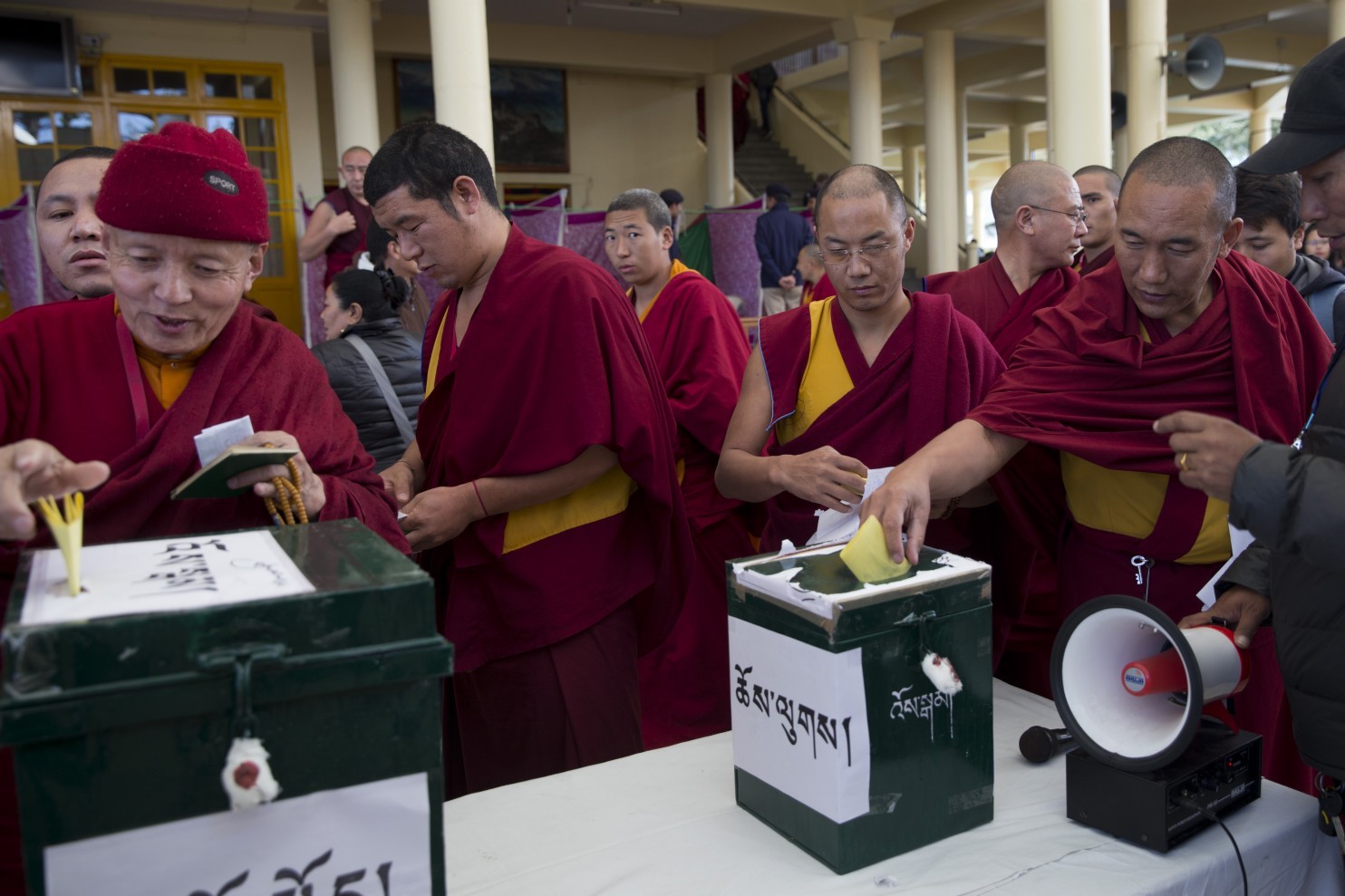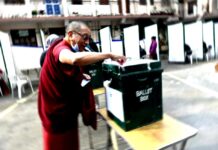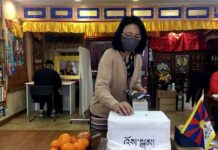
(TibetanReview.net, Dec09, 2018) – Choenyi Woser* suggests that not only is the exile Tibetan democratic process fundamentally flawed but also that the recent amendment of the electoral law by the Tibetan parliament in exile has made it even more murky.
It has been 59 years since Tibetans led by His Holiness the Dalai Lama came into exile following the Chinese occupation of Tibet. In the beginning, a Tibetan government-in-exile was established in India and gradually, by reforming the old governing system, an electoral system was introduced in accordance with the ideals of democracy. Initially, an elected body comprising of equal representations from the traditional Tibetan provinces and religious schools was formed and the number of representatives in the assembly was increased in the following years. Currently, the assembly, now known as the Tibetan Parliament-in-Exile, comprises of ten representatives each from the traditional provinces, two each from the religious schools, two each from North America and Europe and one from Australasia. The Sikyong (President or political head) is directly elected by the Tibetan people.
During elections in our democracy, which takes place without the involvement of political parties, welfare associations of the traditional provinces, non-governmental organizations and voluntary groups introduce and endorse candidates for the posts of Sikyong and membership of parliament. Lately, with the surge in people’s interest in the elections, a number of campaign committees were formed, each supporting their own candidates.
Though the Central Tibetan Administration (formerly known as the Tibetan Government-in-Exile) claims that Tibetan democracy in exile is a genuine and unique one, many people have criticized it as flawed, saying it does not guarantee all the democratic freedoms. There have also been instances during past elections and in the highest-level decision-making on political matters that all the democratic freedoms were not guaranteed.
Dr Tsering Topgyal who studied ‘Political Science and International Relations’ and ‘Chinese Politics’ stated in 2014: “Tibetan democracy in exile is not a complete and ideal democracy. It is a democracy in the reforming stages even though elections are held and the three pillars of democracy exist. Generally speaking, in a democracy everyone should have the right and necessary conditions to participate in elections. Everyone should have equal right to campaign and should be allowed to express their ideological view to the public. And for this to materialize, people should have complete freedom to gather and form organizations and welfare associations. Since our democracy is in the reforming stages, we are facing a lot of issues.”
During the Tibetan parliamentary session held in September 2018, an amendment was adopted in the parliament pertaining to Clause (VII) of Article 24 of the Tibetan electoral rules and regulations which states that ‘all regional associations, religious sects and NGOs are prohibited from nominating and advertising candidates for the posts of Sikyong and membership of parliament. However, if an individual candidate exercises his rights laid down in the Tibetan electoral rules and regulations to express his political ideology at public gatherings, state his commitments, and distribute his individual manifesto to the public, it will not be considered a violation of the above mentioned law. All campaign related activities must cease two days prior to the day of election.’
Not only has this new law been criticized by several people as being a hindrance to the democratic system, it has also left candidates standing in future elections without any clarity in the electoral system.
(1) It is not clear in the electoral rules and regulations whether political parties can participate in the elections. However, by disallowing associations and groups from endorsing candidates, the new law effectively imposes a total ban on political parties from participating in the elections. Although there is no precedence of the Tibetan government-in-Exile being run by a political party, the National Democratic Party of Tibet (NDPT) was formed with the mission to function as a political party and is recognized as such by Tibetans in exile.
I do agree with the decision to bar associations representing the three traditional provinces from interfering in the elections. However, according to the ideals of democracy, prohibiting political parties from participating in elections and barring people from collectively introducing and campaigning for their candidate is prohibition of people’s democratic right to assembly and opinion. Unlike regional and welfare associations, political parties are formed by people with similar political ideology on how a government should be run. For example, the Tibetan National Congress (TNC) was formed with a political stand calling for complete independence for Tibet. And irrespective of its membership strength, TNC does function as an opposition party.
When the NDPT was first established, His Holiness the Dalai Lama had stated: “For Tibet to become a functioning democracy in the true sense of the word, it is important to have various political parties. I think that the establishment of your political party today will definitely serve to fulfil our goals in the future.” It is quite ironic that members of the parliament in exile, who usually indulge in opposing and vilifying others with the claim that everyone should follow whatever His Holiness wishes and states, strongly called for barring political parties and the bill for this purpose was adopted with a very high majority of votes.
The Tibetan leaders in exile are not only too afraid and careful to speak about Tibetan independence, they also oppose those who call for it. Since the TNC endorsed a candidate who unambiguously expressed his stand for Tibetan independence in the last election, it is possible that the members of parliament in exile strongly supported the bill with the sole aim to stop the recurrence of such support actions in future. In addition, during the parliamentary session, many members also stated that it was illegal for regional and welfare associations to endorse candidates in the elections. On what legal basis are we to understand this claim? If participating in the election process by groups representing exiled Tibetans is to be considered illegal, Tibetans in exile are left with very little democratic space and agencies to participate in elections.
In the beginning, in keeping with the wishes of His Holiness the Dalai Lama, equal representation was given to all sections of the Tibetan population in exile, regardless of the differences in the numbers of Tibetans belonging to the traditional provinces and religious sects. During the elections, the NDPT, which does not identify itself as a regional or welfare organization, and voluntary campaign committees formed by groups of people introduced and campaigned for candidates they wanted to see elected as members of parliament from their respective constituencies.
If we are to implement the ideals and principles of democracy, we should gradually embrace reforms and move forward. Since the current Tibetan parliament is set up according to the wishes of His Holiness the Dalai Lama, there is no need to make drastic changes to the current set up. If we could work towards allowing political parties to openly endorse candidates who share their ideology for membership of parliament from all constituencies and let the party with the majority in the parliament to run the government as per their political ideology and introduce necessary reforms, we would be much closer to the ideals of democracy. The public will also responsibly participate in the elections.
(2) If there is no space or platform to introduce candidates during elections, there will be so many candidates campaigning for themselves since none of the concerned associations will announce their lists of candidates. In such a scenario, common people who have only limited awareness or otherwise do not possess the capability to know all the possible candidates may have no choice but to vote for random candidates suggested by their settlement officers and local leaders.
(3) Under the amended electoral law, there is certainly a possibility of the election campaigns being carried out in a positive manner, but equally they could be misused in dangerous ways. Earlier, since introduction of candidates and electoral campaigns were carried out by organizations and voluntary groups or support committees, and debates were organized by known entities, it was possible for a voter to cast his vote after both carefully analyzing the candidates and knowing those who had endorsed them. It thereby empowered voters to vote for the right candidates. But now, since known entities such as organizations and support groups are barred from announcing their candidates, there will be less consolidation of votes for the candidates. In addition, if a group of people who claim to be a support committee under some arbitrary name campaigns for certain candidates, is it possible to implement the penalties if they bring out authorless campaign literature? Such kinds of literature, distributed and circulated among people, are bound to impact public perceptions.
And if such activities are considered to be violation of electoral rules, candidate at the centre of them could attract the penalty of seeing the votes they had won being reduced. People therefore might form various arbitrary campaign committees and advertise for candidates they do not wish to see elected. It will lead to more mudslinging and controversial interpretations on the announcement of candidature. While it may be easy to brush aside actions by identifying it as an authorless campaign literature, they will, nevertheless, definitely affect the candidates, whether for better or for worse. Furthermore, if too many arbitrary campaigning happens, it would be difficult to ascertain how much money has been spent on an individual’s campaign and the source of the funds too. On the contrary, if candidates are openly endorsed by known organizations and associations, there will be no need to cast the vote based on contents of authorless campaign material and no room will remain for unnecessary controversies.
Even if debates between candidates vying for the post of Sikyong and membership of parliament are organized by some organization or media house, especially during the preliminary elections when the number of candidates is much larger than during the final election, it would be extremely difficult to provide equal platform to all the candidates. It is also possible that some invited candidates may not wish to appear on debates for reasons best known to themselves. However, since not all candidates will have the opportunity to express their opinions and commitments on such debate platforms, people will get the impression that the candidates who appeared on these debates have the tacit support of the organizers, which will further lead to more controversies. On the other hand, if there were no such platforms and if every individual candidate was to search for public spaces to express their opinions on their own, not only will both time and space be insufficient, the public may also lack interest to attend them.
(4) During earlier Sikyong elections, various organizations and associations endorsed their own candidates. Not only were various support committees formed for each Sikyong candidate but also some of the support committees continued their support for the same candidates in the next election and functioned like an organization. Election expense is another controversial matter. During earlier elections, the Election Commission set a limit and all the candidates were required to submit their accounts to it. Therefore, in order to get their candidates elected, support groups had maintained financial accounts of all the election related expenses and their sources in a transparent manner. But now, in the absence of endorsements from organizations and support committees who can be held accountable for election expenses, individual candidates are free to spend and submit whatever account they wish to.
Furthermore, it is possible that an individual candidate, after discussing with his supporters, will put up campaign leaflets on walls and secretly contact people at various settlements in order to secure more votes. In such a scenario, if allegations are made that the electoral rules had been violated because candidates had formed secret campaign associations, who will take the responsibility and resolve the issue?
During previous elections, certain associations and administrations did not allow some Sikyong candidates to use their space such as community halls to give public talks while others were allowed to interact with the public. If such incidents are repeated in the coming elections and allegations are raised that the association or administration in question is supporting the candidate, how will the issue be resolved? Will it be possible to implement the penalties mentioned in the electoral rules and regulations?
In a democratic society, an individual cannot run from pillar to post and make all the decisions; organizations and the general public therefore need to work together. During elections, organizations and groups will support their candidates, and they should. Therefore, it is better for groups of people to campaign for their candidates rather than for individual supporters to campaign for their candidates.
Thus, even though we have the right to vote in the Tibetan community in exile, our democracy lacks many of the system’s essential features. If we continue in this way, there will only be hindrances the effectiveness of public gathering and collective decision making. Generally speaking, having the right to vote does not necessarily reflect existence of functioning democracy or freedom of thought.
—
* Choenyi Woser is a journalist who writes in Tibetan language. (Link to the original article in Tibetan: http://bangchen.net/41445/48/28/)
translated by Kalsang Dhondup and Tenzin Gaphel. In case of discrepancies in translation, please consider the original in Tibetan as authoritative.




